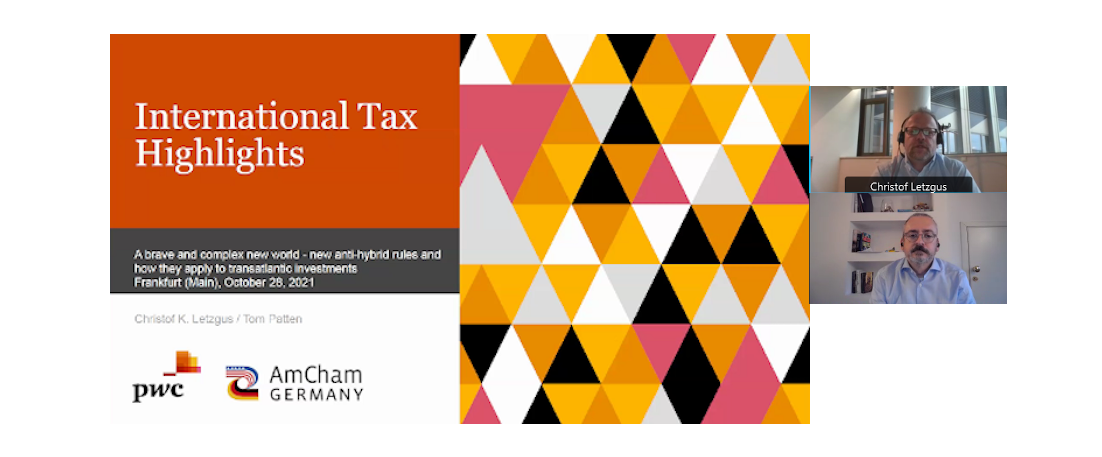As part of the jointly-organized bi-annual event series “International Tax Highlights,” AmCham Germany hosted a virtual Expert Briefing in cooperation with Patron Member PricewaterhouseCoopers GmbH on October 28, 2021. To kick off the webinar entitled “A Brave and Complex New World – New Anti-hybrid Rules and How They Apply to Transatlantic Investments,” tax expert Christof Letzgus, Partner at PwC Germany in Frankfurt, virtually welcomed a diverse audience of AmCham Germany members as well as other interested participants.
In 2016, EU member state governments adopted the Anti-Tax Avoidance Directive (ATAD) for establishing rules against actual or perceived aggressive corporate tax planning. These include so-called anti-hybrid rules, which seek to disincentivise tax planning that takes advantage of mismatches in tax treatment between different jurisdictions. In Germany, the Federal Ministry of Finance issued a last-minute draft bill for implementing the ATAD in December 2019, but no formal legislative steps were taken in 2020. The Federal Government finally submitted its first official Bill to Parliament in late March 2021 and proposed retroactive application to the entirety of 2020. Minor amendments were made, but retroactive application remained in the final law promulgated on 30 June 2021 – the ATAD Implementation Act (ATAD-Umsetzungsgesetz, or ATADUmsG).
This unprecedented approach has made it necessary for companies to review their 2020 tax returns and financial statements to see if any amendments are required and to provide accruals for increased tax liabilities for 2020 and 2021. However, before companies can carry out this analysis and draw conclusions, they need to understand and apply the rules relevant to their international structures. For example, the entity classification rules for U.S. tax purposes are very flexible, and U.S.-parented groups are likely to have “hybrid” entities under the new rules. These can result in expenses being disallowed which were deductible until 2019, or in expenses being included in the tax base of a domestic company which had previously benefited from participation or similar exemption.
Even if company analysis arrives at the conclusion that the new rules are not applicable, taxpayers are advised to properly document their analysis since they may have to prove that there are no hybrid mismatches under the new rules, or that any mismatches have already been resolved in another country. This means that increased compliance and documentation will be necessary, forcing companies to dive much deeper into the maze of foreign taxation rules. Some companies may also need to restructure their intercompany transactions to avoid double taxation and an increased overall tax burden for the group.
The webinar aimed to create clarity with respect to the new rules under the ATADUmsG. The speakers illustrated examples of structures for which the statutory wording and legislative notes do not yet provide clear guidance and discussed them both from a German and U.S. tax perspective as companies will have to do going forwards.
Visit us here for additional information about AmCham Germany's offerings:
Expert Briefings: https://www.amcham.de/services/overview/member-services/expert-briefings/
Tax Committee: https://www.amcham.de/public-affairs/public-affairs-overview/policy-committees/tax
Membership: https://www.amcham.de/members/become-a-member
Email us your questions to membership@amcham.de

